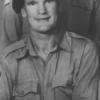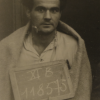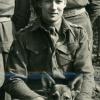In checking official army records, we understand that you may have participated in either the land or airborne assault of Holland in September, 1944. We are therefore writing to ask your help in some research for Cornelius Ryan, author of the LONGEST DAY and THE LAST BATTLE. Would you kindly answer the following questions:
What is your full name, your address and your telephone number (if any)?
Major. John Graham Blunt.
1st Bn, The Zambia Regiment.
P.O. Box 279.
Ndola, Zambia.
What is you present occupation?
Army Officer. Second in Command. 1st Bn, The Zambia Regiment.
What was your rank and unit in September, 1944?
Lieutenant. 2nd Bn, The Parachute Regiment.
What was your age in September, 1944?
26 years.
Where were you born?
Grantham, Lincolnshire, England.
Were you engaged or married then (September, 1944)? To whom? If married, did you have any children at that time?
Single.
What previous action had you seen?
N. Africa 1943.
Primosole Bridge, Sicily, July 1943.
Italy, Taranto to Barletta, September to November 1943.
What were you told at the briefing on the Holland operation?
It is some years and many briefings ago. Memory cannot, therefore, be accurate. I do distinctly remember the impression that we would in the ‘main’ only encounter Garrison troops, and others in a rest area.
What was your reaction?
I, along with my brother officers, could not wait to go, we thought it was one of the most imaginative operations of the war. The delays we experienced were absolutely frustrating.
What were the rumours?
On the ‘brickies’ level (a name for the older subalterns) we thought the 52nd Division, would air-land when we had captured Arnhem, and that we would sweep on into Germany and it would all be over by Christmas.
Did you by chance keep a diary or notebook of what happened to you during the period just prior to September 17, 1944 through September 26, 1944?
Afraid not. There wasn’t really time.
Were any of your friends killed or wounded on the day of the drop or on subsequent days? Do you remember any conversations you had with them before they became casualties?
Yes. I lost a good many of my friends. Jack Grayburn, VC, Peter Cane, ‘Bucky’ Buchanan, Peter Woods, David Wallis and McDermott.
Were you wounded or captured during this period? Can you give details?
Yes. Wounded (shot through the chest) on the evening of Wednesday, 20th Sept 44. Picked up by the Germans shortly afterwards, having been found in a garden by an old lady who reported a wounded British Officer to the Germans.
Do you recall seeing or hearing anything that seems humorous now, even though it may not have seemed so at the time?
An Irish Private knocked out by the blast from a shell, came to and in a rich brogue, said to himself, “I’m dead”, and then a pause for reflection, and again talking to himself said, “I can’t be I’m talking".
Do you recall any incident, sad or heroic or simply memorable, which struck you more than anything else?
Major Digby Tatham-Warter walking down a pretty sticky street, swinging a umbrella he had picked up.
‘Bucky’ Buchanan, who had been taken PW in N. Africa, escaped in Sicily [Italy], awarded the MC, re-joining us as I.O, dropping dead from a bomb blast, without a mark on him.
Do you remember any significant experiences you had with Dutch civilians or members of the Dutch Underground?
I was in the St. Elizabeth Hospital in the next bed to ‘Shan’ Hackett. Diby Tatham-Warter, who had evaded capture, got a message into me, asking if there were any others in the hospital. I managed to get some sort of a list out to him, and shortly after, the Dutch Underground smuggled Brig ‘Shan’ Hackett out.
In times of great crisis, people generally show amazing ingenuity or self-reliance; others sometimes do incredibly stupid things. Do you recall any examples of either?
In over 30 years of soldiering I have never seen anyone so nonchalantly brave as Jack Grayburn. The memories of him in those few days, overshadow any other memory of individuals.
Do you recall any incidents with the Germans? Fights, surrenders, truces or any conversations you may have had with them during the battle or afterwards?
I remember an S.S. Captain walking into the Ward shortly after the Battle, and saying, in good English, “That was a fine fight, and worthy of good soldiers, yours and ours”.
I couldn’t vouch for this, but I think he was the one who took one of the RMO’s back to his ???
The RMO was found on the steps of the hospital next morning with a bullet through his head.
Do you know of anybody else who took part in the operation whom we should write to?
Lt. Col. R. Holburn. Lusaka.
Mr. V. Mason. Ndola.
Major. W.J.J. Barclay. Ndola.
What do you personally remember most about the country of Holland?
A brave people, I personally experienced nothing but kindness from them. I have been back to Arnhem, twice, to pay my respects at the Cemetery, and on each occasion the taxi driver has refused to take the fare.
PLEASE LET US HAVE THIS QUESTIONNAIRE AS SOON AS POSSIBLE SO THAT WE MAY INCLUDE YOUR EXPERIENCES IN THE BOOK. WE HOPE YOU WILL CONTINUE YOUR STORY BELOW OR ON SEPARATE SHEETS OF PAPER IF WE HAVEN’T LEFT SUFFICIENT ROOM. FULL ACKNOWLEDGEMENT WILL BE GIVEN IN A CHAPTER CALLED “WHERE THEY ARE TODAY”. YOUR NAME AND OCCUPATION WILL BE LISTED. THANK YOU VERY MUCH FOR YOUR HELP.
SINCERELY YOURS,
FREDERIC KELLY.
ASSISTANT TO MR. RYAN.
THE READER’S DIGEST.
Only the memories of a rather small cog in the wheel.
The irrepressible Col. John Frost, our C.O., who we subalterns thought the world of. His refusal to surrender when the Germans called on us to do so. The last (Wednesday) evening in the garden of what had been Bn H.Q. Fires everywhere, including the church steeple, the noise of the small arms, and bursting of mortar shells when the y hit the trees, a clear memory of thinking of ‘Dante’s Inferno’, then a funny warm feeling in my body and oblivion, coming to, and being unable to move because, as I later discovered, the bullet had gone through the solar plexus and paralysed me. Talking in a dreamy sort of way to two soldiers who lay near me. Being poked with a bayonet by a German, who probably thought I was booby trapped, and telling him I wasn’t dead. Being taken from the St. Elizabeth’s first to Apeldoorn, and then by cattle truck into Germany, and so I became a ‘Kriegie’ until May 1945.
October 20, 1967.
Major John G. Blunt
1st Battalion
The Zambia Regiment
P.O. Box 279.
Ndola, Zambia.
Dear Major Blunt,
I’d like to thank you for completing the questionnaire I sent you recently concerning Cornelius Ryan’s new book on OPERATION MARKET GARDEN. I have read it with a great deal of interest and I have found there are several further questions which I’d like to ask.
Since it is quite unlikely I shall be in Zambia, I’m afraid I’m ging to have to beg your indulgence while I attempt to interview you by post.
First, I’d like to know your exact capacity in the 2nd Battalion. That is, were you attached to Div H.Q. or were you with one of the companies of the battalion?
At approximately what time did you arrive at the bridge? Were you among the first there? Where did you go? Could you draw me a brief sketch of the area as you remember it, marking each position you personally occupied from Sunday to Wednesday? Were you at battalion headquarters? If so, where, to your best recollection, was it in relation to brigade headquarters? What floor did you occupy there and do you recall, by chance, the type of building it was (private home, public office) and any distinguishing characteristics of the building itself or the room you were in?
When do you first recall seeing Major Digby Tatham-Warter strolling along swinging the gamp [umbrella]? Did he come along the street that ran parallel to the ramp, heading toward the river, or would he have been further on, perhaps along the road running under the ramp itself? Do you remember where you were and what attracted your attention to him? Do you recall him raising the umbrella? Did he speak to you or did you say anything to him? What, in effect, was said? What were you thinking? Did you call anybody attention to the Major? Was there much mortaring then or mostly small arms and/or automatic weapons fire?
You mentioned an Irish private knocked out by a blast who, upon recovering, dazedly said, “I’m dead”. Can you recall approximately when that was and whether it was during the day or night? Do you remember the private’s full name? Was he, possibly, one of
[Line missing]
When were you taken to the St. Elizabeth’s Hospital? Were you conscious when, a few days later, Brigadier Hackett was brought in? What do you recall of that? Did you recognize the brigadier immediately? Did he look, to you, in pretty bad shape? Was he conscious then? Were you warned at all beforehand that he was being brought in? Were you told or cautioned in any way not to reveal who it was. But to refer to him as “Cpl. Jones or Smith”? Did you have a chance to speak to him prior to the time he was operated on? If so, can you remember anything of particular significance about your conversation? Had his badges of rank been removed before he was admitted?
Approximately when did you receive Major Tatham-Warter’s message? Who brought it to you? The Underground? How was it smuggled to you or was it simply handed to you? Can you remember, in essence, what it said? What did you do? That is, did you tour the wards, looking for men with good escape potential? Did you write back within a couple of days? Who smuggled the message out? Approximately how long after that was Brigadier Hackett smuggled out?
Were you aware the Underground was going to try and get him out? Did you have any idea how they were going to do it? What was your role, if any, in the attempt? Did the brigadier indicate to you he was going to be gotten out? Did he seem, to your knowledge, to be at all concerned the Germans might discover his identity? Were there any close calls or slips on the part of the men? That is, can you ever recall an occasion when someone nearly ‘let the cat out of the bag’ insofar as the brigadier’s identity was concerned?
What do you recall of the smuggling out of Brigadier Hackett? Were you near him when it occurred? Was it during the night and what happened? Were you able to help in any way? Did you get any definite word in a day or two that the attempt was successful? If not, when did you first learn for certain the brigadier had been rescued?
Were you a close personal friend of Jack Grayburn? What do you remember about the man; what, to you personally, were his outstanding characteristics?
Do you recall any one personal event involving Lt. Grayburn and either participated in by yourself or witnessed that overshadows any others; a particular attack, perhaps, a quiet moment with him? Frankly, it is not enough to, in passing, this man rushed a bridge or led a bayonet charge. Somehow, we must bring him alive. He was too gallant, too human, to rely on official reports.
Did the Germans personally call on you to surrender? How? Through a loudspeaker system or by envoy? Can you possibly recall them sending a captured British airborne soldier back to Col. Frost with a message for you to surrender? Were you present when the
[Line missing]
I realize, major, what a lengthy task I’ve set for you, but I do hope you’ll forgive me. You have the answers to some of the questions I’ve been asking myself ever since Mr. Ryan and I started the project, nearly two years ago. I hope I haven’t imposed upon you to greatly.
I would appreciate it very much if you would return your answers as quickly as possible. I am in the process now of completing this end of the research and your answers will help to fill in a sizeable gap.
I look forward anxiously to hearing from you. I should add that any additional details you might care to include or any comment you feel you should make about these events or any other that come to mind will be heartily welcome. Thank you very much for you kind help.
Yours sincerely,
Frederic Kelly.
Assistant to Mr. Ryan.
P.S: I should say I am very aware of the fact that these events took place 23 years ago and memories fade. Please just do the best you can.
P.S. 2: Upon rereading this, I note I have referred a couple of times to you being attached to ‘Div H.Q.’ Please amend that to read ‘Battalion H.Q.’ My apologies.
F.K.
No Reply: Jan 12, 1968.
NOTE: Lieut. John Blunt was mentioned just once in the book – ‘A Bridge Too Far’ – on page 332.
Source:
Ohio University website. Kindly researched by R Hilton
Read More




Latest Comments
There are currently no comments for this content.
Add Comment
In order to add comments you must be registered with ParaData.
If you are currently a ParaData member please login.
If you are not currently a ParaData member but wish to get involved please register.